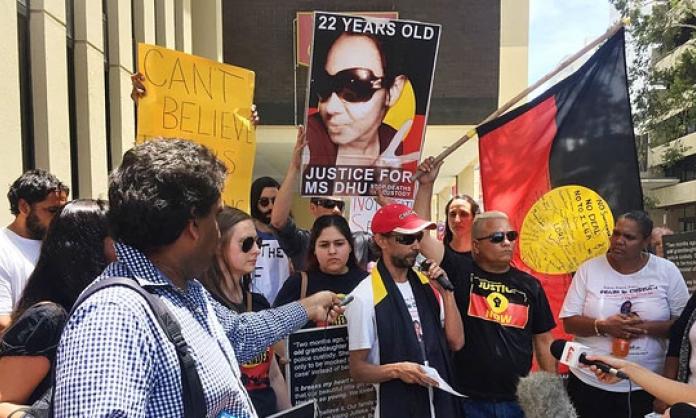A 22-year-old Aboriginal woman, Ms Dhu, died in police custody on 4 August 2014. She was one of about 1,100 people locked up in Western Australia in 2014 because of an unpaid fine.
More than a year on, the coronial inquest into her death has only just begun. It won’t be until next year that her family will hear testimony from police. Ms Dhu’s uncle, Shaun Harris, told Al Jazeera that the further delay will be an excuse for vague answers to questions about his niece’s last days.
“By March, the police are going to be testifying that they ‘don’t recall’”, he said. “We’ve heard it all this week and it’s been 14 months. Imagine four more months? It’s a massive insult to the family after what they’ve done.”
Already, details emerging from the inquest are harrowing. On 23 November, the ABC reported that on Ms Dhu’s third and last visit to hospital, staff at South Headland Health Campus diagnosed her with severe staphylococcal septicaemia. By then it was too late.
The infection started around two broken ribs Ms Dhu sustained from domestic violence. According to the pathologist who examined her body, the infection was advanced and would have been detectable at the time of Ms Dhu’s arrest and on each occasion she was taken to the hospital.
Counsel assisting the coroner, Ilona O’Brien, told the inquest that Ms Dhu had complained of severe pain from her first night in the Port Hedland lockup.
Police ignored Ms Dhu’s reports of pain and cold limbs many times. When they did finally take her to hospital, shift supervisor Sergeant Rick Bond recorded her transfer as “not urgent”. He said that she appeared “to be suffering withdrawals from drug use”, the ABC reported.
Throughout her ordeal, police told health staff that she was “faking it”. Twice she was declared fit to be in custody and returned to her cell.
By her third trip to the hospital, Ms Dhu was in severe septic shock. Though barely conscious, she was handcuffed and her limp body dragged into a police car by her arms and legs. An officer told her to “shut up” when she moaned in pain, according to O’Brien.
“They left her there like a dog, to die”, her father told the inquest.








